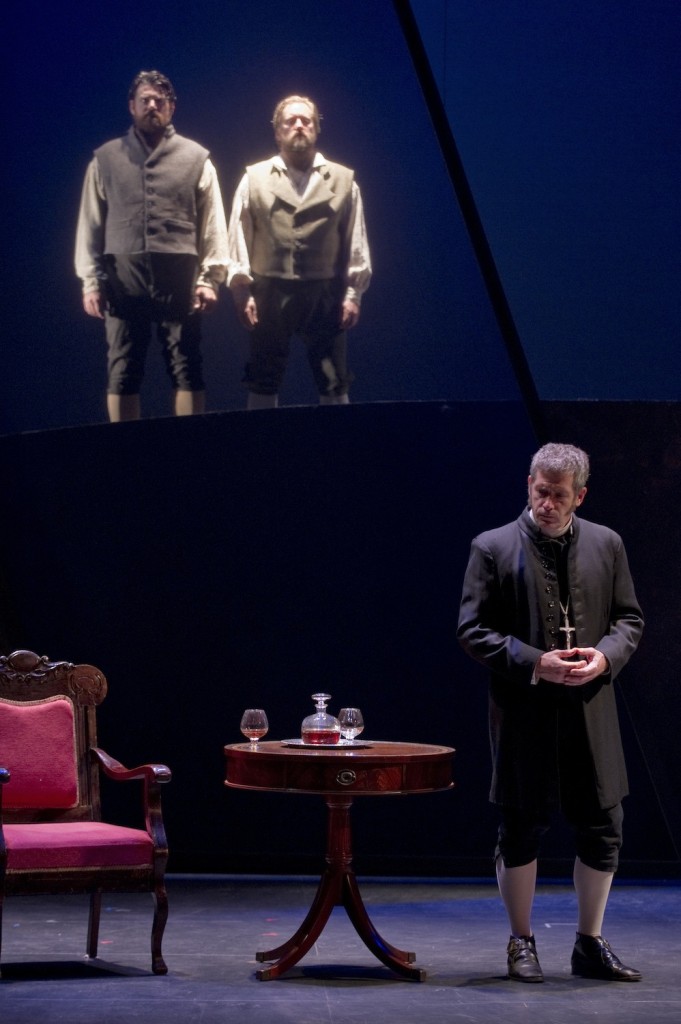Gritty new opera explores a Massachusetts miscarriage of justice

Keith Phares as James Halligan, Alan Schneider as Dominic Daley, and William Hite as Father Cheverus (foreground) in “The Garden of Martyrs.” Photo: Jon Crispin
Dominic Daley and James Halligan were at the wrong place at the wrong time.
Their trial, conviction, and execution by hanging in June 1806 for a murder in western Massachusetts became an instant cause celebre. Evidence for their guilt was largely circumstantial, the most damning of which came from the testimony of a teenage boy, who said that he saw the two men near the crime scene. The final chapter of their saga came in 1984, when Governor Michael Dukakis pardoned the two men. Daley and Halligan may have been innocent of the murder, but they were guilty of a social crime: they were Irish Catholics in a largely Protestant country.
The story is the basis for The Garden of Martyrs, a new opera by Eric Sawyer and Harley Erdman that had its world premiere Friday night at Northampton’s Academy of Music.
Erdman’s slick and gritty libretto, based on Michael C. White’s 2004 novel of the same name, covers the last week of the Irishmen’s lives. Daley and Halligan await their execution in a Northampton jail. Outside, anti-Catholic feelings run high, and the multitude that has gathered to watch the hanging are openly hostile to any Irish “papists” who set foot in town.
That tension was made all the more palpable by Sawyer’s score. His music brims with spacious intervals, transparent textures, and agitated rhythms, all of which came alive through the crisp playing of the Springfield Symphony Orchestra. Conductor Keith Rhodes led with broad, energetic gestures.
The orchestral music was well suited to Sawyer’s mostly declamatory vocal writing. But there were plenty of lyrical moments that gave the cast a chance to shine. Dominic’s wife Finola, performed by soprano Amy Johnson, seeks help from a priest in a sweeping and aria, “Give him solace.” And the priest, Father Jean Cheverus, has his own checkered past and vices, including an admitted weakness for women and drink. William Hite’s clear, smooth tenor voice well-suited the wise and repentant Father, who travels to absolve Daley and Halligan before their execution.
Sawyer adapted to good effect some of Irish music’s stereotypical elements. A keening solo flute, woodwind drones, and harp added color. There are even strains of Irish folk music, retooled to fit the music’s distinctive style. An imprisoned Dominic Daley, sung by tenor Alan Schneider, sang a sweet-toned “Banks of Roses,” the orchestra adding sheets of dissonant lines to the melody.
Schneider and baritone Keith Phares, who sang with a dark and powerful baritone as Halligan, were the standouts of the cast. Their polar-opposite roles made for an odd couple of protagonists and a surprising bit of raw humor. Daley, a devout Catholic and family man, and Halligan, a potty-mouthed philanderer and militant atheist, traded jabs about women, food, and less savory topics.
In the supporting roles, mezzo-soprano Chrystal E. Williams sang with palpable emotion as Yvette, Cheverus’ housekeeper, and mezzo Dorie Goldman captured the boyish tone of Laertes Fuller, the teenaged star witness in the murder trial.
Elsewhere, Friday night’s performance suffered from uneven singing. As the stalwart Attorney General John Sullivan, an Irishman who spared no love for Catholics, Vernon Hartman sang with a rich, full-throated tone. By the close of his aria in Act I, his voice strained on a few notes, perhaps due to fatigue. When he returned for Acts 2 and 3, he had regained his focus.
In the role of the Widow Clark, a Northampton resident who is among the first to suspect that Daley and Halligan are innocent, Marjorie Melnick brought soft and supple sound to her lullaby in Act 2. Her voice, though, couldn’t compete with the waves of sound from the orchestra during her entrance aria.
The period costumes–white dresses, brown jackets, knee-breeches, and hats—were as simple and effective as the set’s chairs, table, barrels, and hanging backdrops.
The Garden of Martyrs will be repeated 3 p.m. Sunday at the Academy of Music in Northampton, Mass. thegardenofmartyrsopera.com
Posted in Performances




Posted Sep 28, 2013 at 11:09 pm by Alice
Glad to see this appreciative review!
-Alice